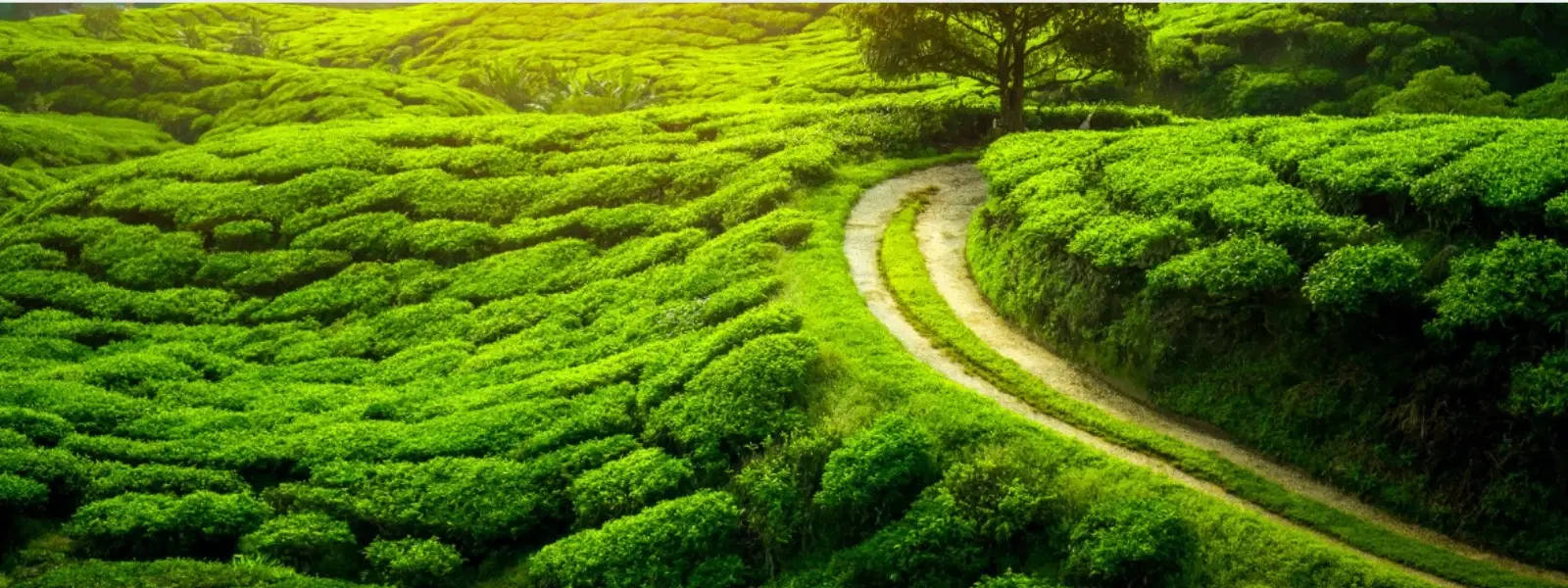
Hotels
•04 min read

Imagine a serene morning light filtering through lush green tea gardens, where gently flowing rivers mirror the calm skies above. India's riverside tea estates offer this picturesque landscape, inviting tea enthusiasts, nature lovers, and curious travelers to immerse themselves in a world where nature, culture, and history blend harmoniously.
This guide is designed to help you explore these captivating destinations like a pro. Here, you will learn about the unique charm of riverside tea estates in India, discover top spots offering breathtaking views, and gather insider tips to enhance your travel experience.
Riverside tea estates are unique due to their geographical location and the climatic conditions that nurture the tea plants. The proximity to rivers creates a microclimate, ensuring optimal humidity and temperature, which enhances the flavor and aroma of the tea. Moreover, these estates are steeped in history and cultural significance, often surrounded by ancient traditions and local lore, making each visit a journey into the past.
India is home to renowned tea production regions such as Assam, Darjeeling, Dooars, and Kerala. In these regions, riverside tea estates play a vital role in tea cultivation. For instance, Assam's fertile plains, Darjeeling's misty slopes, Dooars' eclectic greenery, and Kerala's rolling landscapes all contribute to producing some of the world's finest tea varieties. Understanding these regions provides valuable insight into the diverse practices of tea cultivation in India.
Several tea estates stand out for their awe-inspiring riverside views. In Assam, the expansive estates near meandering rivers offer a rugged yet enchanting landscape. Darjeeling's estates, with their historical charm and panoramic vistas, provide a glimpse into colonial-era tea production. In Munnar, the rolling hills and flowing streams set the perfect backdrop for a sustainable tea-plantation experience. Each destination features its own unique blend of history, ambiance, and tea varieties, making them among the best tea estates in India.
Eco-conscious travelers will appreciate the organically managed tea farms that dot India's countryside. Many of these estates emphasize sustainable practices, ensuring that the cultivation process respects the environment while preserving traditional methods. These organic tea farms promote eco-tourism, offering visitors a closer look at the intricate process of tea cultivation, from plucking to processing, all set against the backdrop of serene, scenic tea plantations in India.

Travelers can easily book Indian tea estate tours and packages that cater to various budgets and interests. Whether you are a budget-conscious wanderer or someone looking for a detailed tour with in-depth insight into tea cultivation in India, there are options to suit every need. When choosing a package, consider the duration, the inclusions (like guided tours or tea tasting sessions), and what aspects of tea production you want to explore.
For those looking to indulge, luxury tea estate stays provide a blend of comfort and tradition. Many estates offer boutique accommodations and heritage bungalows that come with amenities such as intimate tea tastings, guided plantation walks, and rejuvenating spa treatments. These experiences allow you to savor the essence of riverside tea gardens while enjoying the high-end comforts that make your stay memorable.
Timing your visit can significantly enhance your experience. The ideal time to explore riverside tea estates in India is during seasons when the weather is mild and the tea harvesting festivals are in full swing. This not only ensures pleasant weather but also provides a chance to witness the thriving culture of tea cultivation—an immersive experience for any traveler.
To fully enjoy your visit, come prepared with comfortable clothing, sun protection, and a camera to capture the scenic vistas. Engage with local guides who offer deep insights into the nuances of tea production. Participate in tea tasting sessions, take part in plantation walks, and explore the production process. Such proactive engagement enriches your journey, turning a simple visit into a memorable experience.
Each tea estate is not only a hub of tea cultivation but also a keeper of centuries-old traditions. The cultural heritage of tea in India dates back to colonial times and is interwoven with local folklore. Interacting with the local community and learning about their way of life adds a rich, educational layer to your travel experience. Understanding these histories allows you to appreciate the full spectrum of what India's tea gardens have to offer.

Pro Tip: "Did You Know? Some of India’s riverside tea estates offer exclusive workshops where visitors can learn the art of tea blending and packaging. It’s a must-try for tea enthusiasts!"
The No 1 tea estate in India is often considered to be Makaibari Tea Estate in Darjeeling, known for its premium teas and sustainable practices.
The largest tea estate in India, located in Assam, is owned by the Assam Company India Limited.
The oldest tea estate in India is the Singtom Tea Estate in Darjeeling, established in 1850.
The costliest tea in the world from India is the Darjeeling Silver Tips Imperial, which is handpicked under moonlight and sold at premium prices.
India’s riverside tea estates captivate the soul with their blend of natural beauty, cultural history, and a deep connection to tea cultivation. This guide has delved into what makes these estates unique, highlighted top destinations to explore, and provided practical tips for planning a visit. Whether you are drawn by the allure of scenic tea gardens or the taste of freshly brewed perfection, these destinations offer an unrivaled experience for every traveler.